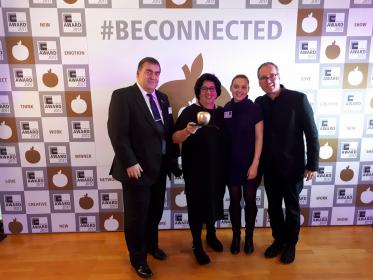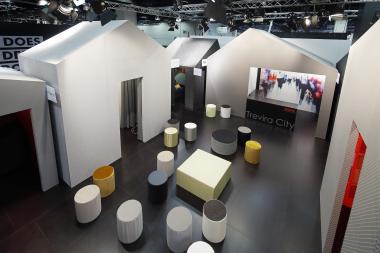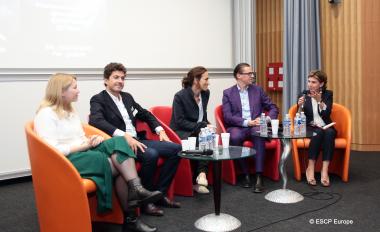Famab Award: Golden Apple for Trevira fair stand
At the Famab award ceremony in Ludwigsburg on 23 November, the Trevira City fair stand – shown at Orgatec 2016 in Cologne last year – won the Golden Apple in the architecture category – Best Stand M. The Famab Award is a hugely prestigious accolade for integrated brand experiences. It honours major international projects in the fields of architecture (temporary or permanent) and interpersonal communication.
Trevira´s CEO, Klaus Holz, said, “We are delighted that our Trevira City has been awarded the Golden Apple. We would like to thank interior designers raumkontor for coming up with such a fantastic idea for our stand, and we´d also like to say a big thank you to the organisers for making the award ceremony at the Forum am Schlosspark in Ludwigsburg such an enjoyable experience.”
The Trevira City, which was developed by the interior designers at raumkontor and realised by Buchhold and Glindemann GmbH, took up the fair’s theme: “New Visions of Work”. Trevira City, which comprised eight houses made of fabric, showed textile solutions for modern work environments. It offered a new perspective on modern work environments where the borders between working and living become blurred, thereby demanding new approaches to design. In between the houses, an open space was created that stands for the central themes of efficient work processes: communication, creativity, inspiration, networking, and motion.
The fibre manufacturer, who was a first time exhibitor at Orgatec, presented its stand in collaboration with six fabric partners who showcased their products in one of each of the houses: Baumann Dekor, Casalegno Tendaggi, Fidivi, Hohmann, Müller Zell, Pugi. The various facets of the exhibition display the huge range of possibilities created by the participating manufacturers with their Trevira CS products.
Other fabric suppliers also contributed to the textile furnishings of the fair stand. Création Baumann, JAB Anstoetz, Mattes & Ammann, and Silent Gliss were the sponsors for the textile decorations in the two Trevira houses.








